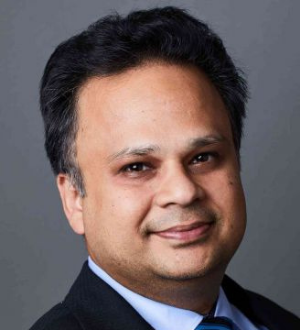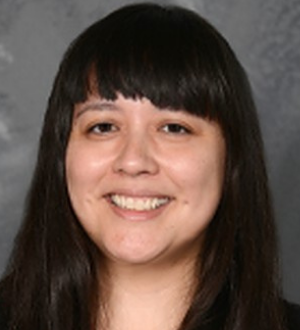
This May, the Department of Population Health Sciences joins the nation in celebrating Asian American Pacific Islander (AAPI) Heritage Month. Observed for the entire month since 1992, May is a time to reflect on the unique life experiences of all members of the AAPI community and acknowledge their significant contributions to the country. This year’s theme is “Advancing Leaders Through Collaboration.” Join us in getting to know some of the AAPI faculty and staff who make up the department. We thank them for sharing more about their personal heritage and encourage one another to continue learning about AAPI history.
Dr. Samprit Banerjee
Samprit Banerjee, PhD, MS, is an associate professor of population health sciences in the Division of Biostatistics. He is proud to belong to the AAPI community and represent the country where he was born and raised, India.

Dr. Samprit Banerjee
Dr. Banerjee’s heritage shaped the person he is today. Personally, he learned to be patient with other people and tolerant of other views. “I come from a family of educators. My grandfather, father, and aunt were all professors,” he said. “This love for education has influenced me to take the lead in developing educational programs in the department.” Dr. Banerjee was the founding director of the biostatistics and data science track in the Master of Science in Healthcare Policy and Research program. He is also the founding director of the PhD program in population health sciences.
He stays connected to his heritage by keeping in touch with friends and family from India and celebrating his culture during festive seasons like Diwali and Holi. He also is aware of the challenges facing his culture, namely in the forms of microaggression and racism. “People in the AAPI community are considered as ‘others’ and not as well integrated into society,” he said.
Dr. Banerjee is grateful to have several mentors and role models who have helped him develop into who he is today. One mentor, in particular, is George S. Alexopoulos, MD, professor emeritus of psychiatry at Weill Cornell Medicine. “He has helped me learn how to effectively express my scientific thoughts and results, a very important skill in our business,” he said.
Dr. Banerjee has been with the department since 2008 and has significant experience in biomedical collaborations, ranging from randomized clinical trials to observational cohort studies and analysis of mHealth data.
Dr. Czarina Navos Behrends
Czarina Navos Behrends, PhD, MPH, is an assistant professor of population health sciences in the Division of Comparative Effectiveness & Outcomes Research. She feels connected to the AAPI community through her heritage and the various AAPI cultures of people that have always been in her life. Dr. Behrends’ family immigrated from the Philippines to Hawaii and then to Guam (where she was born), before moving to the mainland.

Dr. Czarina Navos Behrends
She was raised by her Filipino grandparents and is very close with her extended Filipino family. This deeply influences the way she sees the world. “Being a half-white American and half-Filipina American (hapa) means sometimes not feeling like you belong fully to one culture or the other,” she said. Dr. Behrends’ Filipino grandparents have been the most important people in her life. “The balance of my grandfather's passion for what is happening politically/socially in the world and my grandmother's incredible compassion for others is what I aspire to embody to proudly live out their legacy,” she said.
She stays connected to her heritage and memories of her family through cooking recipes that have been handed down through generations of excellent cooks in her family. She also enjoys large gatherings with family where everyone can sing karaoke or her uncle’s Filipino band performs song covers.
Dr. Behrends notes that the past few years have been an especially challenging part of AAPI history in the U.S. as anti-Asian hate has increased. “Racism is in the history of this country, touching every person of color, and we need to really evaluate that and what we could all do to make it better,” she said.
Dr. Behrends’ research is dedicated to achieving health equity and social justice for people who use drugs. She also serves as PHS's diversity and inclusion champion. Her grandparents have influenced her desire to be involved in meaningful work for inclusion, equity, and justice. Dr. Behrends has been with the department since 2015, when she originally joined as a postdoctoral associate.
Philip Jeng
Philip Jeng, MS, is a research manager in the Division of Comparative Effectiveness & Outcomes Research. To him, the AAPI community is a vast collection of diverse cultures banded together to advocate for recognition and respect in American society. “The AAPI community celebrates the nuances between the cultures of its members while still addressing issues such as otherization, the model minority myth, and disparities in healthcare,” he said.

Philip Jeng
Jeng notes the model minority myth as a considerable challenge facing the AAPI community. “By portraying all AAPIs as success stories living the American dream, the myth completely erases folks who need support, socially and financially,” he said. Despite being a “so-called good stereotype,” the myth is ultimately harmful to the AAPI community. Jeng also commented on the rise in hate crimes and the perpetual foreigner stereotype. “We do not need to prove how loyal we are to the U.S. and that we deserve to be safe in our home,” he said.
For Jeng personally, there has never been a point in his life when he was not aware of his heritage and how others may treat him differently for it. However, instead of resenting his background, he fully embraced his culture and being a member of the AAPI community by supporting local businesses, conducting personal research about his heritage, and using the language more in everyday life.
Growing up, Jeng’s grandfather was a major role model. “He refused to compromise on his beliefs, despite pressure from both sides of a culture war,” he said. With the support of his grandmother, Jeng’s grandfather worked hard as a recent immigrant to make sure his family had what they needed to thrive in Queens.
Professionally, Jeng’s heritage has taught him that a strong work ethic is essential. He has been in several roles at WCM since 2016.
Bonnie Tse
Bonnie Tse is a communications specialist supporting the Center for Health Economics of Treatment Interventions for Substance Use Disorders, HCV, and HIV (CHERISH). She was born and raised on the Lower East Side and has called Chinatown her home for nearly three decades.

Bonnie Tse
Tse mastered the winding roads and shortcuts within Chinatown before she learned the grid system of New York City. She owes her familiarity with these streets to her parents, who worked in the heart of Chinatown. “They helped me see Chinatown as a place to connect with my cultural roots—starting with neighborhood eateries and bakeshops,” she said. “With my parents as my guide, the bounty of sweet and savory selections and the Cantonese exchanged with the Yee-Yees (aunties) and Sok-Soks (uncles) behind the counter nourished me with sustenance and customs from my heritage.”
Fong Inn Too, Golden Fung Wong Bakery, and Ho Won Bakery are a few of the many places Tse frequents to practice her Cantonese and indulge in tofu pudding, mooncakes during the Mid-Autumn Festival, and grass-jelly ice in the summertime.
In 2017, Tse noticed a shift in Chinatown’s landscape. Long-time eateries began to close, and new high-rises developed in the neighborhood. This change sparked her interest in honoring, documenting, and helping Chinatown thrive, and also in supporting grassroots movements and groups advocating for community-led development. One campaign she highlights is the Two Bridges Community Plan. “Supporting this plan ensures truly affordable housing for the community and also protects the fabric and cultural institutions in Chinatown that have rooted my family and me in Lower East Side,” she said.
Tse has been a strong supporter of the AAPI community in her neighborhood, volunteering her time and skills across many organizations over the years. She has been part of the department since 2021.
Dr. Jiani Yu
Dr. Jiani Yu, PhD, is an assistant professor of population health sciences in the Division of Health Policy & Economics. In recent years, Dr. Yu has been interested in health delivery systems and how innovation can improve the value of care. “My heritage has impacted my interest in working toward the collective good, which plays an integral part in influencing my research passions,” she said.

Dr. Jiani Yu
Dr. Yu stays connected to her heritage in everyday life through her family’s dumpling recipes and stories from Beijing, China, as well as playing Mahjong with her grandmother. She views the AAPI community as an ethnically diverse group of individuals who have a shared connectedness. This is fostered by learning to bridge different spheres of cultures and societal norms, including balancing traditionally Eastern and Western values, while oftentimes struggling to find equity, inclusion, and safety in the U.S.
She currently sees overcoming the stigmas surrounding mental health as a critical issue facing the AAPI community. “Acknowledging and seeking mental health services is difficult for many people in the AAPI community who grew up with societal norms of downplaying mental health needs and putting up a stoic exterior,” she said. She hopes that the availability of more health care data specific to the AAPI community, including data disaggregated by ethnicity, can improve awareness of mental health issues and increase the use of mental health services within the AAPI community.
Dr. Yu has been with the department since 2019, where her focus has been on telemedicine as a way to improve traditional brick-and-mortar forms of care.
Dr. Yongkang Zhang
Yongkang Zhang, PhD, MS, is an assistant professor of population health sciences in the Division of Health Policy & Economics. Dr. Zhang feels deeply connected to the AAPI community, especially when he is far from his family in China.

Dr. Yongkang Zhang
Dr. Zhang stays connected to his heritage by cooking Chinese food, one of the most important parts of Chinese culture to him. He also celebrates traditional Chinese festivals with friends, such as the Spring Festival and the Mid-Autumn Festival. In his spare time, he reads news and books about China and the AAPI community. While his primary research focus is on the U.S. healthcare system, he also studies the Chinese health system with colleagues with shared interests.
Dr. Zhang’s cultural heritage has helped him value diversity, inclusion, and differences in his personal and professional lives. “Chinese culture believes in ‘harmony but not uniformity,’ meaning that we can achieve harmonious co-existence on the basis of respecting differences and diversity,” he said.
Dr. Rainu Kaushal, MD, MPH, senior associate dean for clinical research at WCM and chair and professor of population health sciences, and Dr. Lawrence Casalino, MD, PhD, MPH, professor of population health sciences, have provided Dr. Zhang with important professional guidance. “Their mentorship made me realize that my research can improve diversity and address disparity,” he said. He has collaborated with them both during the COVID-19 pandemic on studies to address healthcare disparities and improve equity.
Dr. Zhang has been with the department since 2017, when he initially joined as a postdoctoral associate.
Dr. Banerjee, Dr. Behrends, Jeng, Tse, Dr. Yu, and Dr. Zhang are just a handful of the AAPI members of the PHS community who contribute to our continued success. We thank them for sharing their experiences with us and invite the members of the department to continue learning more about our AAPI colleagues and the national history around this heritage month.
- Highlights

